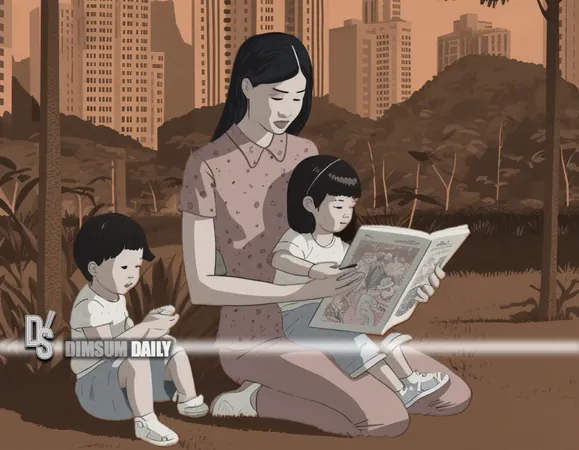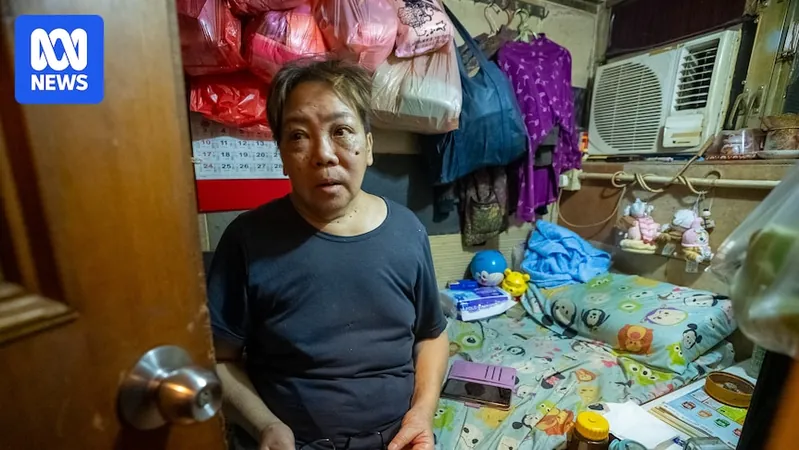
Hong Kong’s Adoption Crisis: A Society Obsessed with Perfection
2024-12-22
Author: Ying
December 22, 2024 – Hong Kong, often flaunted as Asia's "world city," conceals a troubling reality: a city gripped by fear and anxiety regarding its own youth. With an alarmingly low fertility rate of just 0.7 children per couple, one might expect a thriving environment for adoption. Surprisingly, adoption rates are faltering, spiraling down from 71 in 2016 to a mere 59 in 2020. This is a distressing trend in a city where 101 children languish in care facilities, many pigeonholed as having "complicated family backgrounds" or "special needs." Such labels serve as euphemisms for being deemed too difficult to adopt for status-conscious families in Hong Kong.
At the heart of the adoption dilemma lies a cultural obsession with genetic lineage and social status. Many birth mothers considering adoption are stigmatized as “bad people,” while hopeful adoptive parents wrestle with irrational fears of parenting children who are not biologically theirs. This tragic mindset perpetuates a vision of a society prioritizing pedigree over compassion.
Take a stroll through the playgrounds and schools of Hong Kong, and you'll be greeted with an unsettling sight: empty swings and dwindling classroom numbers. The city is aging rapidly, yet thousands of children remain confined to residential care until they reach adulthood at 18.
One inspiring figure is Mrs. Ip, who has fostered an incredible nine children since 2002, including several with special needs. “When children feel that you treasure them, they will treasure you in return,” she reflects, offering a refreshing counter-narrative in a city entangled in the pursuit of perfection over true family values.
In response to the declining birth rate, the Hong Kong government has introduced initiatives such as a “baby bonus” program worth HK$520 million, offering HK$20,000 per newborn. Unfortunately, while financial incentives might seem promising, they fail to tackle the entrenched cultural attitudes towards adoption.
The adoption landscape is exacerbated by an alarming preference among prospective parents for international adoptions, which are deemed “cleaner” by many. However, even that avenue is closing with increasing evidence of trafficking concerns in traditional source countries. The pressure of Hong Kong's elite only compounds the issue, as they would rather remain childless than adopt locally, fearing social judgment.
According to reports, deaths now outnumber births by 18,100 each year in Hong Kong, a stark indication of a potential demographic crisis. Instead of embracing adoption as a viable solution, the government obsesses over attracting foreign talent and labor, ignoring the deep-seated biases festering in society.
A staggering 58% of individuals opting for childlessness cite the high-pressure education environment as a central reason for their decision. This creates a paradoxical situation in which a society, obsessed with family prestige, is literally breeding itself towards extinction.
The rare success stories, like that of Mrs. Ip nurturing children who thrive, highlight the potential joy and fulfillment that adoption can bring. Yet, such instances remain infrequent in a climate where familial constructs are often reduced to mere genetic connections.
Ironically, while Hong Kong's population dwindles, malls overflow with designer-clad couples doting on their purebred dogs—substitutes for the children they won’t adopt. Until the community collectively confronts its fear surrounding adoption, it risks becoming an extravagant haven for retirees, void of children who bring vibrancy and hope.
Rather than merely introducing more governmental programs or public housing solutions, Hong Kong needs an overhaul of its cultural frameworks regarding adoption. Until this transformation occurs, the city remains trapped in a self-inflicted conundrum: a landscape filled with children waiting for a home and families unwilling to embrace them—caught in a pit of perfectionism that stifles connection and compassion.




 Brasil (PT)
Brasil (PT)
 Canada (EN)
Canada (EN)
 Chile (ES)
Chile (ES)
 España (ES)
España (ES)
 France (FR)
France (FR)
 Hong Kong (EN)
Hong Kong (EN)
 Italia (IT)
Italia (IT)
 日本 (JA)
日本 (JA)
 Magyarország (HU)
Magyarország (HU)
 Norge (NO)
Norge (NO)
 Polska (PL)
Polska (PL)
 Schweiz (DE)
Schweiz (DE)
 Singapore (EN)
Singapore (EN)
 Sverige (SV)
Sverige (SV)
 Suomi (FI)
Suomi (FI)
 Türkiye (TR)
Türkiye (TR)